Graham Ellis - my blog
Improving Bus services - England to Melksham South
A really good Option 24/7 meeting last night - community members from all across the county (and a handful from a little beyond) looking at the future of buses in our suburban streets, between our towns, and serving our villages.
Public transport use has been decimated by Covid and the restrictions imposed by it, and the Government's "Bus Back Better" initiative looks forward not only to bringing use back, but to taking things forward further.
Quoting from the Government line:
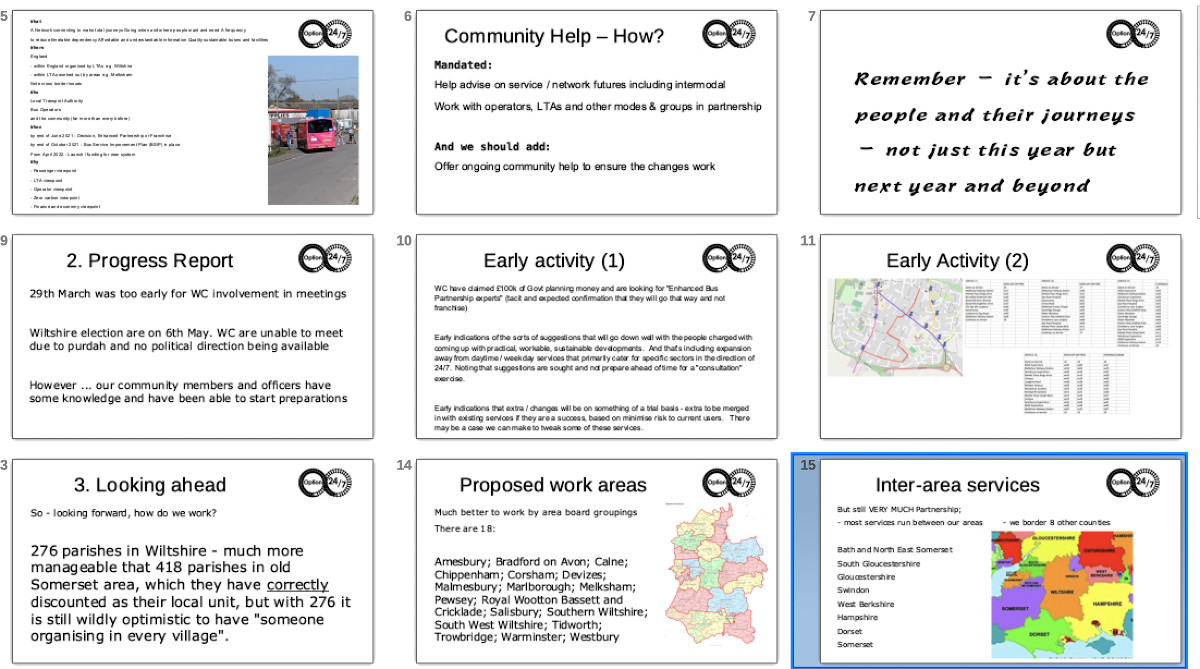 We note how well this aligns with what we (at Option 24/7 ) have been saying for years - "have they run with our idea" asked one of our team. They may have read what we've written, but what they have said and seen is common sense so it's no great surprise.
We note how well this aligns with what we (at Option 24/7 ) have been saying for years - "have they run with our idea" asked one of our team. They may have read what we've written, but what they have said and seen is common sense so it's no great surprise.
I'm posting here on my campaign blog for a Melksham Town Council seat, but really the topic is wider - looking at the whole of Melksham, the whole of the Community Area, the whole of Wiltshire, and indeed beyond - looking at buses and other public transport as a connectional lifeline with inter-area services to no less that eight other authorities that border the community area.
It was my role last night to correlate and precise the data into a presentation, publicise the event, and deliver much of the content. Presentation is online ((here))
Published Tuesday, 20th April 2021Public transport use has been decimated by Covid and the restrictions imposed by it, and the Government's "Bus Back Better" initiative looks forward not only to bringing use back, but to taking things forward further.
Quoting from the Government line:
| Buses are at the centre of the public transport network, making 4.07 billion journeys in England in 2019/20 For decades, buses have been largely ignored by policymakers. Unlike rail, road aviation, cycling or walking, there was not – until now – a national strategy for buses. And unlike rail or road, buses have never – until now – had long-term funding commitments. Almost uniquely in the developed world, bus operators themselves, outside London, decide where most services are run and what to charge. COVID-19 has caused a significant shift from public transport to the private car. To avoid the worst effects of a car-led recovery – cities and towns grinding to a halt; pollution, road injuries, respiratory illness and carbon emissions all rising – we need to shift back quickly, by making radical improvements to local public transport as normal life returns. Buses are the quickest, easiest and cheapest way to do that. To achieve our goal, this strategy will make buses more frequent, more reliable, easier to understand and use, better co-ordinated and cheaper: in other words, more like London’s, where these type of improvements dramatically increased passenger numbers, reduced congestion, carbon and pollution, helped the disadvantaged and got motorists out of their cars. We want the same fully integrated service, the same simple, multi-modal tickets, the same increases in bus priority measures, the same high-quality information for passengers and, in larger places, the same turn-up-and-go frequencies. We want services that keep running into the evenings and at weekends |
 We note how well this aligns with what we (at Option 24/7 ) have been saying for years - "have they run with our idea" asked one of our team. They may have read what we've written, but what they have said and seen is common sense so it's no great surprise.
We note how well this aligns with what we (at Option 24/7 ) have been saying for years - "have they run with our idea" asked one of our team. They may have read what we've written, but what they have said and seen is common sense so it's no great surprise.I'm posting here on my campaign blog for a Melksham Town Council seat, but really the topic is wider - looking at the whole of Melksham, the whole of the Community Area, the whole of Wiltshire, and indeed beyond - looking at buses and other public transport as a connectional lifeline with inter-area services to no less that eight other authorities that border the community area.
It was my role last night to correlate and precise the data into a presentation, publicise the event, and deliver much of the content. Presentation is online ((here))
Promoting Melksham in Reading
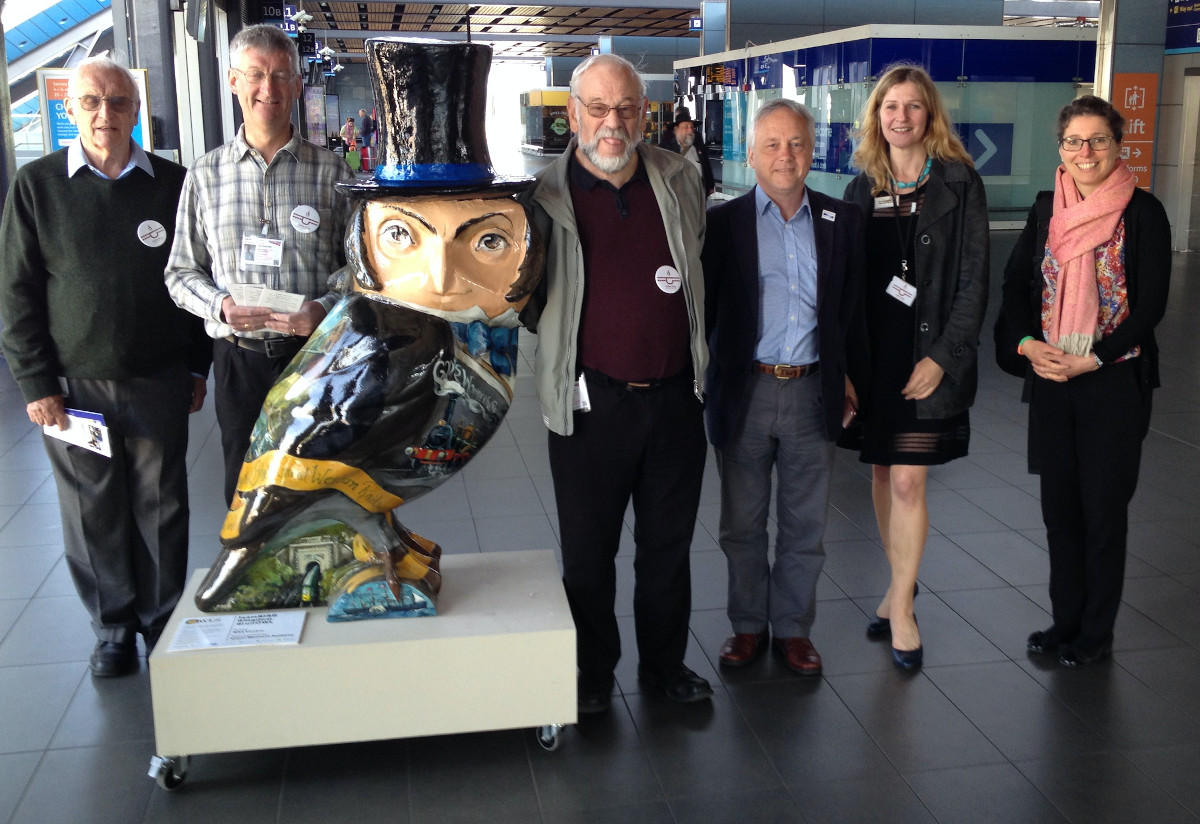 Looking back through old pictures yesterday, I came across this one of myself and friends promoting rail travel on the line through Melksham - "Community Rail" - in Reading, in May 2019. Very much a co-operative venture with data for Three Rivers, Heart of Wessex and Devon and Cornwall on our stand in Reading, and with our data on theres elsewhere at London (Waterloo), Birmingham New Street, and some other places too. Our own is "Isambird Kingdon BrownOwl" - one of the Owls of Bath from the previous year which we adopted at auction and now roosts at our home in Melksham.
Looking back through old pictures yesterday, I came across this one of myself and friends promoting rail travel on the line through Melksham - "Community Rail" - in Reading, in May 2019. Very much a co-operative venture with data for Three Rivers, Heart of Wessex and Devon and Cornwall on our stand in Reading, and with our data on theres elsewhere at London (Waterloo), Birmingham New Street, and some other places too. Our own is "Isambird Kingdon BrownOwl" - one of the Owls of Bath from the previous year which we adopted at auction and now roosts at our home in Melksham.Melksham is a town ripe to attract tourists, especially given the expected move towards more domestic holidays. Working with folks like Visit Wiltshire (where we were members when I ran the hotel) and the Community Rail Network, we can and could do a great deal more to attract visitors in. Although Melksham was the largest town for many a mile some 200 years ago, and has a wealth of history and historic buildings, it really doesn't present itself for visitors. As a hotel, our biggest leisure business was people staying with us to see Bath, less than 10 miles away, and attarcted by better hotel prices. Many said what a lovely town it is, but much of the benefit of that is untapped.
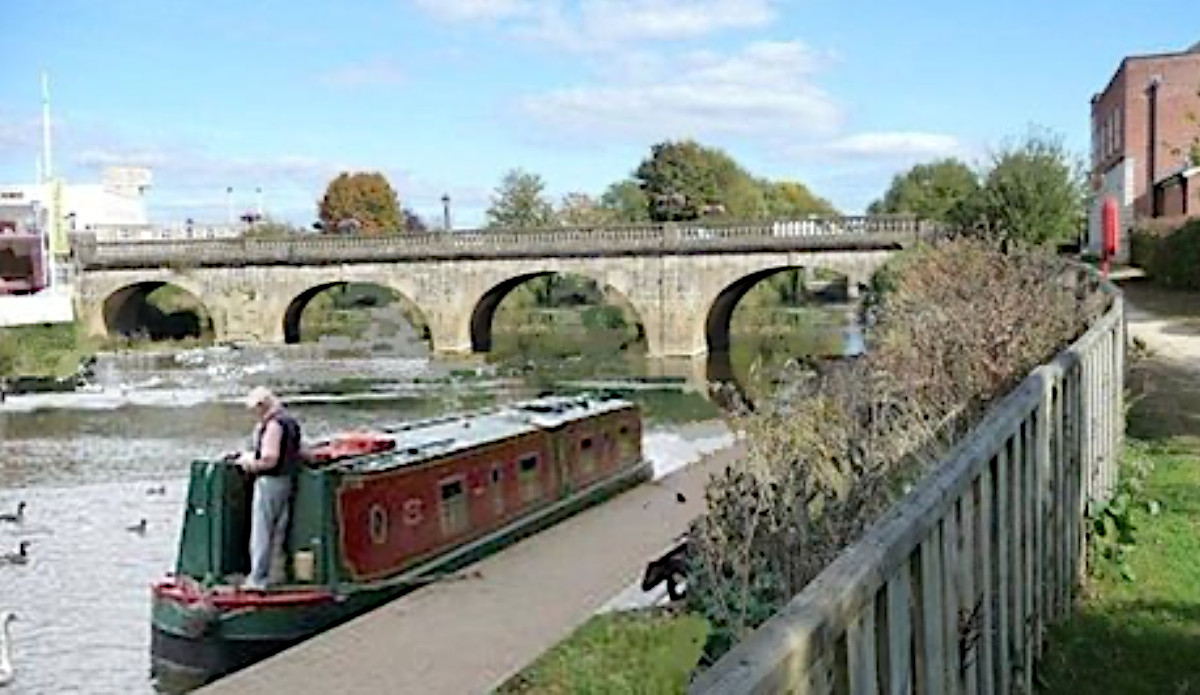 People do need something to attract them ... I am not suggesting a big marketing campaign this summer - yes, there is history, but what is there to do? No theme park behind Melksham House, no nature trails in the forest, not yet boats to see and cafes and shops on the riveside. But the riverside, and the Berks and Wilts Canal, is a portent of things to come.
People do need something to attract them ... I am not suggesting a big marketing campaign this summer - yes, there is history, but what is there to do? No theme park behind Melksham House, no nature trails in the forest, not yet boats to see and cafes and shops on the riveside. But the riverside, and the Berks and Wilts Canal, is a portent of things to come.The countryside around is lovely too - I'm not really (am I?) suggesting people come to Melksham and then go out again, but it's a wonderful base for the Kennet and Avon, Bradford-on-Avon, Devizes, Lacock, The Courts and those little hidden gems such as our own Pack Horse Bridge. I'm told that the Melksham area offers rich viewing for electricty plyon enthusiasts too, though that's probably too small a specialist group to make a significant economic difference to the town.
Published Monday, 19th April 2021
Melksham Bypass - answering "are you for or against"?
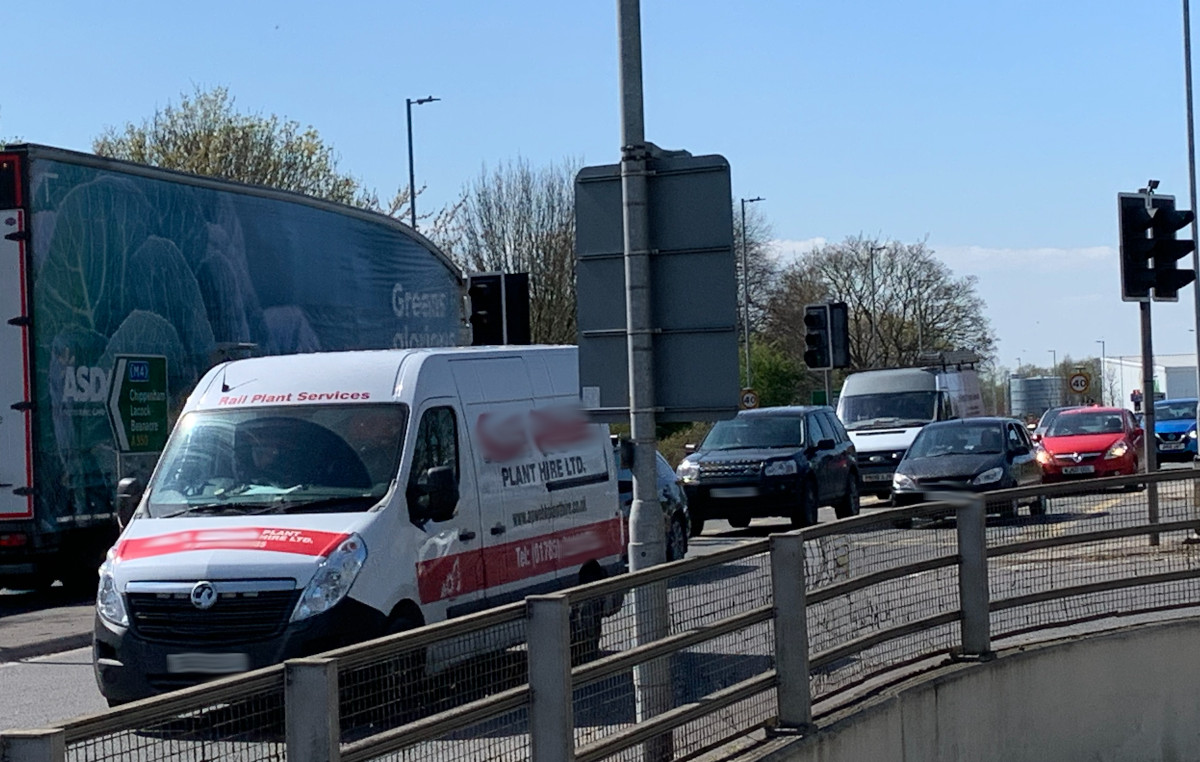 Melksham has a traffic congestion around its outskirts. In particular, this is on the road used by traffic headed between north and south, with pinch points in the Melksham North ward. The congestion leads to delays ... effect on the economy, effect on air quality, safety issues, unpleasant to live nearby, separates the town from the northwestern area and the railway station.
Melksham has a traffic congestion around its outskirts. In particular, this is on the road used by traffic headed between north and south, with pinch points in the Melksham North ward. The congestion leads to delays ... effect on the economy, effect on air quality, safety issues, unpleasant to live nearby, separates the town from the northwestern area and the railway station. There are other issues too. Traffic through Beanacre, through the town centre headed towards Calne, and the road out through Woodrow.
Where are things changing? What's needed for the future?
1. With the closure (for how long?) of the Cleveland Bridge in Bath, much of the heavy traffic that's gone across / through there is the past is spilling into Wiltshire, and passing past Melksham on the A350.
2. The introduction of the Clean Air Zone in Bath also encourages heavy traffic into Wiltshire - £100 extra cost going through Bath is more than the extra cost of driving through Wiltshire
3. Towns to the south are growing, adding more vehicles passing Melksham on their way to the motorway
4. Melksham is growing too - and the natural way out for many of the homes and businesses coming is also via the A350 up towards the M4
5. Coronavirus has encouraged people to use private transport (cars) in preference to public transport - as I write, car traffic looks pretty much back up to where it was before the first lockdown, but public transport use is well down.
All of those suggest increase traffic ... but on the other hand
A. If people are working from home more, they will be commuting to work less
B. As we move towards Zero Carbon, we'll be replacing 'dirty' cars with cleaner ones - though on its own this will mean replacing dirty queues with cleaner queues - good score but no bullseye
C. As we come off Coronavirus, we now have an opportunity to rebuild public transport use, and taxation and other government policy can influence this.
D. As vehicles become more and more electric, Bath's Clean Air Zone will apply to fewer and fewer vehicles and less traffic will divert.
E. The Cleveland Bridge might reopen, or the MRUG suggestion of shortening journeys by linking the A36 and A46 may be considered as a less intrusive road scheme which would result in lower mileage.
Discussion
Interventions short of building a complete new bypass may be effective in providing for future traffic levels considerably lower that would have been expected in forecasts made a couple of years ago. Some of these were in the recent consultation, though there is a view in some quarters that they were included at this stage so they can be ruled out early on and not subject to successful challenge later.
It is impossible (in my view) to accurately forecast traffic levels 10, 20, 30 years ahead, especially at the current time. Yes, we can probably get some idea but there will be a wide splay of uncertainty. The nature of roads is that they cope up to a certain point and then a relatively little extra traffic causes them to fall over with congestion, and regular users looking for alternatives - often inappropriate rat runs. Put those two things together, and Wiltshire Council has a real problem working out what to do for parts of the A350, including Chippenham, Melksham, Yarnbrook and Westbury. Their difficulty is compounded by a potential need to take steps that take years ahead of the situation getting too bad.
I am concerned at the "de facto" standard that seems to be set for the A350 to become the North-South route of choice, rather than the current A36 / A46 trunk routes. I can understand the desire from a "keep it in our county" perspective, and indeed now within the Western Gateway SNTB; the A36 / A46 strays into Somerset which is in Western PENINSULAR. I am also concerned at the separation of the Melksham Bypass consultation from the Wiltshire local plan consultation; asking about housing to be served by the new bypass during that consultation elicited an "out of bounds" response from Wiltshire Council and rendered the consultation far less useful. I wonder if that was intentional.
So - my answer to "are you for or against?"
I started writing this to answer the question, in the lead up to the elections, as to whether I am for or against the Melksham Bypass, and whether or not I will say one thing in public and then take a different approach in private / later on.
At the moment, I don't know if I am for or against. I would PREFER other measures and solutions such as improving the current trunk route rather than creating a new one, and such providing much improved and greener public transport so that private car traffic levels, and fossil fuelled lorries, are reduced. Whether those can go far enough, I don't (yet) know. There may be a case for some relatively small road interventions short of a bypass (and indeed we have already seen some) and interventions which make a substantial difference to greener ways of travelling too.
I can and will listen to what people ask / tell me - but I'm aware that one man's reduction of congestion is another's lost walk down to the canal. And I'm also aware that as a Town Councillor, I'll only have a position from which I can persuade and explain, and not be a decision maker. I can promise that whatever the outcome, I will do what I believe is best, and I will keep checking back with people in the town to check that I remain inline and haven't overlooked elements. Some decisions on a strategic route WILL need to me made for the greater good of the region as a whole, and may not be best for Melksham.
Looking ahead to the future, as plans develop
I will also take a pragmatic view, in that even if a decision is taken with which I and the ward do not agree, I will stand for getting the most appropriate outcome for the ward in that final solution, and I will not take the position of complaining in a pure negative way such that we get nothing. Example - bypass gets built to the east ... OK then, we need to provide foot and cycle ways over a reduced-traffic Challeymead bridge to bring the Hazelwood Road area a pleasant walk and cycle to Asda, Aldi, Leekes, McDonalds and to the railway station.
Perhaps I could gain votes by running a petition or survey to rally the troops. I see it going on elsewhere in the area, with a current councillor pointing at an external "bogey man" when he himself appears to have been caught napping. I don't expect to hear much more after 6th May. Yuk.
If you have read this far - THANK YOU. Sorry it wasn't a "yes / no" answer, but it's an answer that should set the scene for what I am and where I stand for coming years, not just the next 3 weeks. And you can look back at all my old personal blogs and records - chamber of commerce at http://www.wellho.net/resources/Z402.html - public transport (rail) at http://www.wellho.net/resources/Z501.html - cycling and walking at http://www.wellho.net/resources/Z531.html - politics and religion at http://www.wellho.net/resources/Z300.html - buses at http://www.wellho.net/resources/Z511.html . Proud to stand by those; nothing deleted ... all in the open. Current writings at http://grahamellis.uk/perm.html
Published Sunday, 18th April 2021
On Melksham Bypass and housing growth
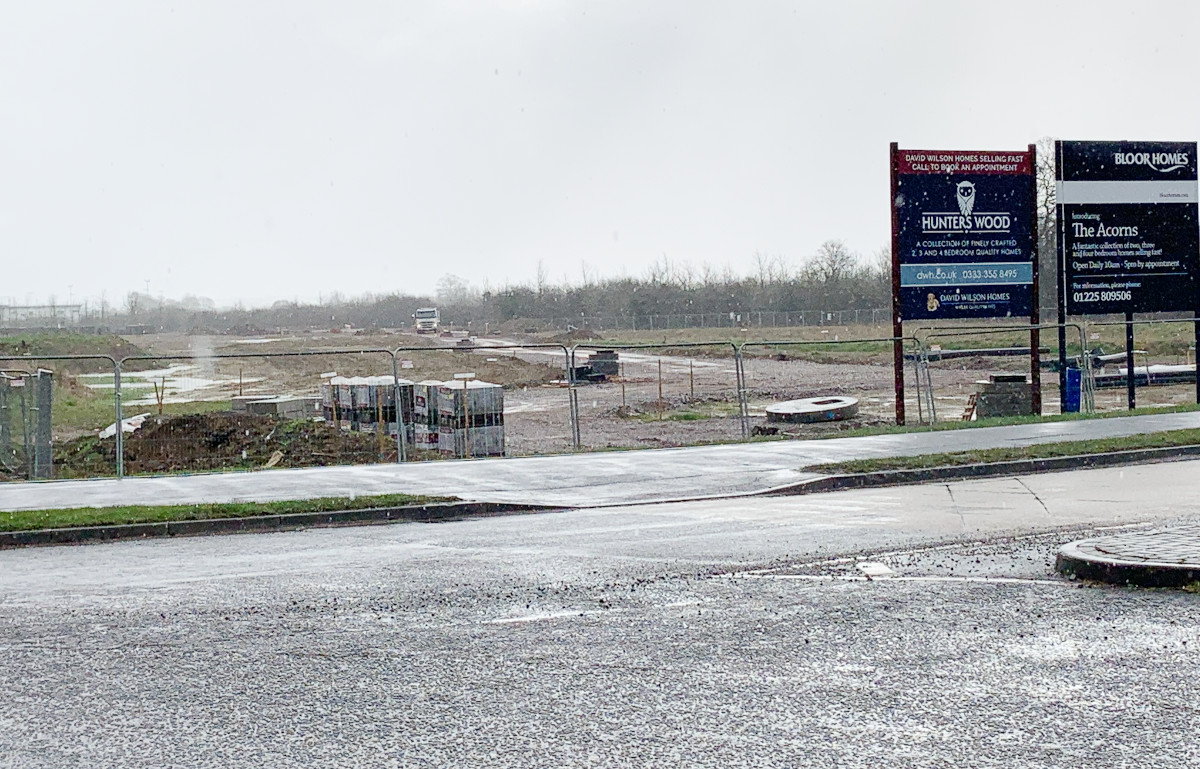 Full item in the writing (to be published tomorrow morning) ... but I have referred to links in a Facebook exchange already - see ((here)) for the Melksham Rail User Group input to the Bypass consultation and ((here)) for the group's input to the Wiltshire Council Local Plan.
Full item in the writing (to be published tomorrow morning) ... but I have referred to links in a Facebook exchange already - see ((here)) for the Melksham Rail User Group input to the Bypass consultation and ((here)) for the group's input to the Wiltshire Council Local Plan.Both can be characterised as providing positive suggestions and noting concerns rather than campaigning; the role of MRUG is to promote and improve appropriate train, bus, cycling, walking (and powered private vehicle connections too) travel to, from, through, past and within Melksham. The MRUG response does not extend to the politics of whether Melksham should be extended.
While I am providing links ... readers may be interested in my talk at the "Connected Cities" seminar last August - see ((here)) which looks forward at transport within the area in our cluster of towns, as and if (which is likely) they continue to grow.
Here, for continuity and context, is my text to which I refer above:
Take a look at positive options (alternatives to a bypass) which offer long term solutions and benefits that fit in with strategic objectives, stated and unstated. The world IS changing and with those changes, and with other less intrusive and greener changes that could be made, I query the justification. Much of the analysis so far appears, to me, based on pre-covid, pre-zero-carbon data and if likely to be wrong, WebTAG needs updating. And good argument can be raised for a BETTER solution to issues and not a NEGATIVE "we don't want this". I helped co-authour the MRUG response to the consultation - not political, but it may give you some thoughts. I will post a link at http://grahamellis.uk in a couple of hours.
For readers in BOWERHILL - there were fewer candidates for the parish council that vacancies, so you could have got on the council by rights just by offering to stand. There will probably be a further opportunity after 10th May to be co-opted, but that will now be down to the people who have already put themselves forward to choose and invite. In MELKSHAM SOUTH - too late; both Town Council and Unitary are contested. Best you can do is choose the person or people who are most in line with you.
Long reply - in summary - there ARE alternatives; in my view, the best approach is to promote things light on lots-more-roads; if (in the end) we end up with a road - at least it will have been thoroughly tested and probably the better for that. And we will then need and want to work with it for the best ancillary outputs.
For readers in BOWERHILL - there were fewer candidates for the parish council that vacancies, so you could have got on the council by rights just by offering to stand. There will probably be a further opportunity after 10th May to be co-opted, but that will now be down to the people who have already put themselves forward to choose and invite. In MELKSHAM SOUTH - too late; both Town Council and Unitary are contested. Best you can do is choose the person or people who are most in line with you.
Long reply - in summary - there ARE alternatives; in my view, the best approach is to promote things light on lots-more-roads; if (in the end) we end up with a road - at least it will have been thoroughly tested and probably the better for that. And we will then need and want to work with it for the best ancillary outputs.
Published Saturday, 17th April 2021
Town Councillor - job spec and what I can do for you
| These are my views about what a town councillor should stand for, be and do. They are what I will stand for if elected for the south ward of Melksham on 6th May 2021. They might look like statements of the obvious - they do to me. But I have learned that many of them are not shared by other candidates, so I am listing them as MY understanding. What do I stand for? * I stand for a vibrant Melksham with appropriate growth * I stand for a town that has a strong heart and healthy lungs * I stand for a safe, green and pleasant town * I stand for a town that is welcoming to all irrespective of gender, race, age, religion, ability * I stand for a town making good of climate change, and Covid recovery * I stand to help provide local services best provided through a town council at a good price * I stand for saying the same things prior to the election and then once elected * I stand for a town that treasures its staff, volunteers, councillors and residents * I stand for a town that encourages visitors to add to our life and economy * I stand for a town that encourages businesses of all legal and appropriate types * I stand to help make inputs to planning, unitary, regional and national issues as they effect the town and its people. * I stand for a town that cares for its schools, roads, parks, town centre, transport, playgrounds and residents. What do I believe a Town Councillor should do (and I will do my best) * Live in the ward they represent * Tell you (the electors) what's really happening and not decide issues in a caucus * Get back with people when they ask questions, be available to all * Nurture the excellent base we already have and encourage it to develop * Put his or her heart into positive change for Melksham and neighbouring communities * Represent the people who elected him/her * Be independent of political or group interest before and after the election * Look after funds prudently. * Offer only very limited grants to organisations with which (s)he is involved. * Have the time and energy to fulfil the role throughout the four year term * First picture - "Going through hoops for you" Now - experience, which will differ from that of other candidates. * Lived in Melksham for over 20 years * Run and grown a customer facing business here * President of Chamber of Commerce for 8 years * Campaigned for improved train service (and got it!) over many years * Campaigned against bus service cuts (and helped save many) * Worked to get new Campus in the town (rather than out beyond Bowerhill) * Provided evidenced inputs on behalf of groups to consultations to help steer thing. * Surveyed, organised and manned stalls, written and distributed leaflets, cleaned and litter picked. Not just for election, but ongoing and regular. * Stuck around with each of the above and worked with others to make sure they work. If you live in Melksham's South Ward, I would really appreciate your vote in the forthcoming (6th May) elections. I am standing as an independent, and being newly retired I have time to continue to serve the community - now in this additional way. |      |
Published Friday, 16th April 2021
Melksham Public transport - a growing need in the next decade
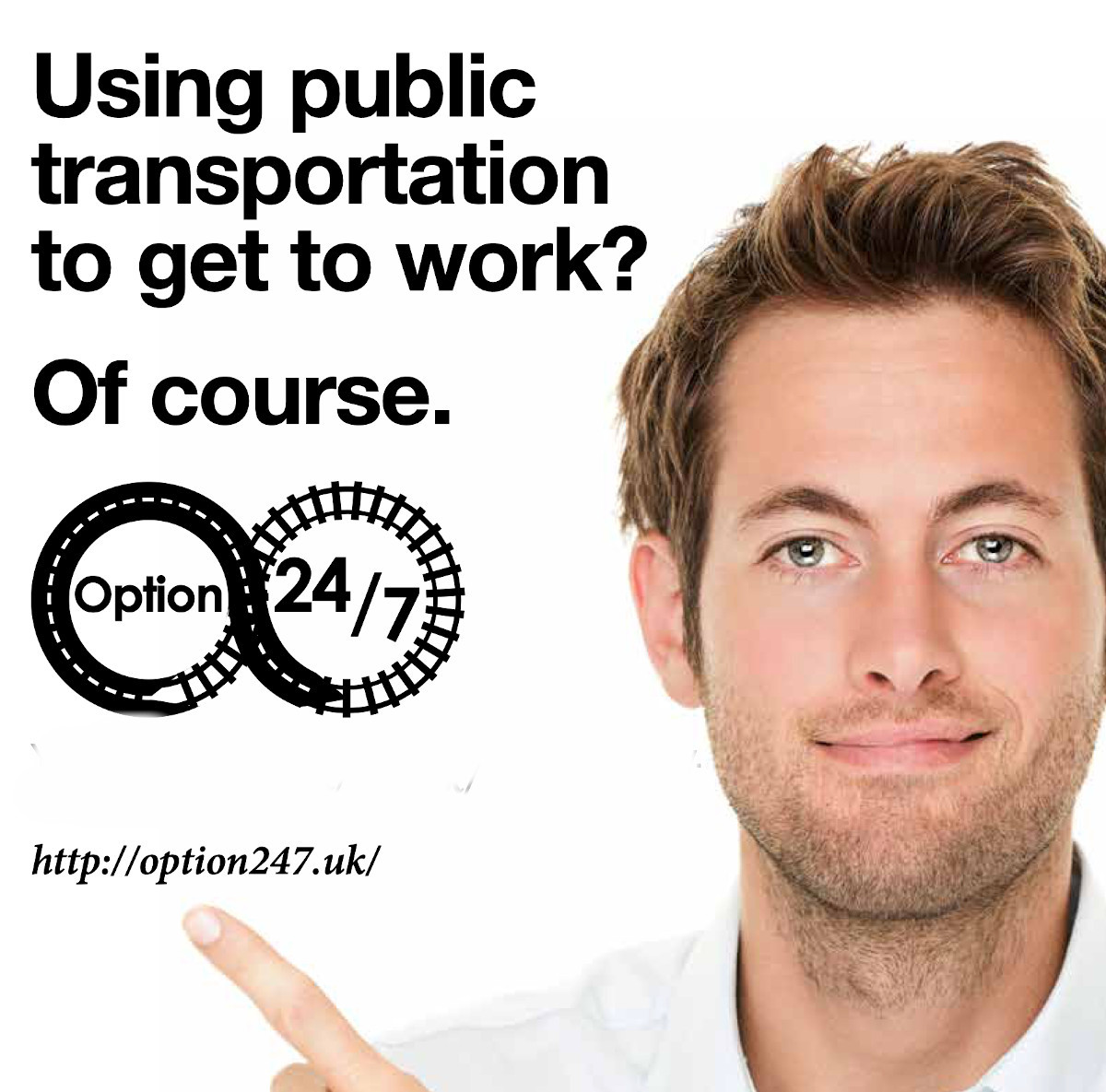 Bus and train campaigning and surveying has given me a unique insight into the lives of many people who live and work here in Melksham, including those for whom age, medical, economic or other reasons, or choice, use public transport rather than driving. And I am delighted to report significant public transport improvements which to some extent are the results of my work and that of many others. There are still gaps in provision, and areas where we have lost services - in some cases causing real hardship. And much remains to be done to tune things for the future.
Bus and train campaigning and surveying has given me a unique insight into the lives of many people who live and work here in Melksham, including those for whom age, medical, economic or other reasons, or choice, use public transport rather than driving. And I am delighted to report significant public transport improvements which to some extent are the results of my work and that of many others. There are still gaps in provision, and areas where we have lost services - in some cases causing real hardship. And much remains to be done to tune things for the future. By providing an integrated public transport network of quality, we can not only provided better for those who cannot drive, but also provide an environment in which people who could drive choose to use public transport. That encouragement required running services as a network with connections between services, an understandable fair and flexible fare system, timetables and other information (including real time tracking so you know when your service will arrive), clean, well lit bus stops (with current information there), and welcoming warm, safe, smooth vehicles with friendly staff. It also requires in most cases service that run from early in the morning into the late evening, and at sufficient frequency to enable people to travel when they wish without having to plan around an infrequent service.
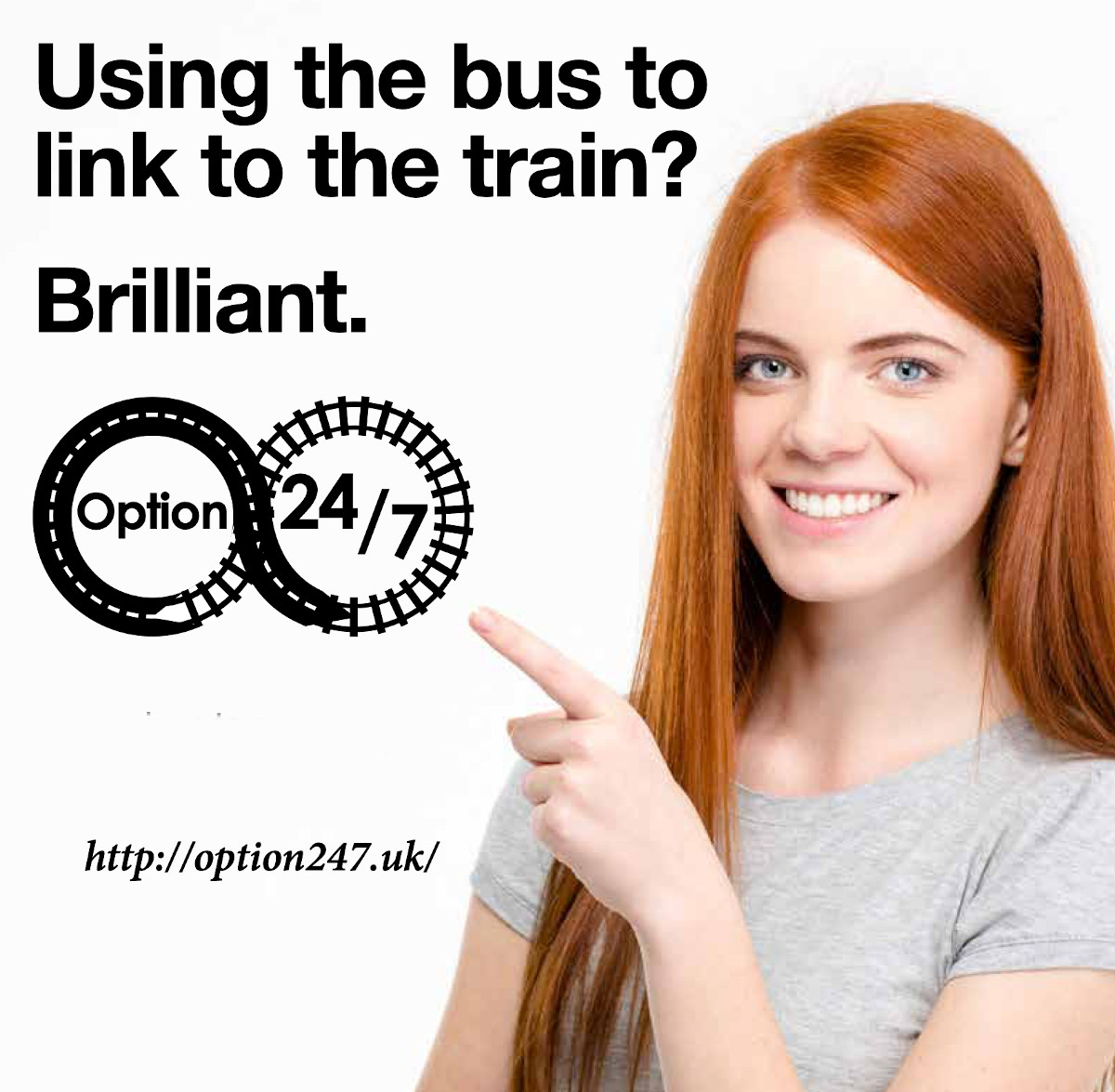 Does it sound like I am describing Utopia? Perhaps it does - but it is very practical, with more buses and trains, on a wider variety of routes, each carrying more passengers than current services do. Taking the train service, where passenger numbers have risen from 3,000 per annum to 75,000 in a decade (on a rise from 2 to 8 trains per day), modelling suggests a rise to between 250,000 and 400,000 in the next few years if the service rises to 15 services per day.
Does it sound like I am describing Utopia? Perhaps it does - but it is very practical, with more buses and trains, on a wider variety of routes, each carrying more passengers than current services do. Taking the train service, where passenger numbers have risen from 3,000 per annum to 75,000 in a decade (on a rise from 2 to 8 trains per day), modelling suggests a rise to between 250,000 and 400,000 in the next few years if the service rises to 15 services per day. That rise is not just numbers - it's people. It's your teenage son headed off to Swindon to meet friends. It's you yourself not driving to the office - but leaving the car at home for your partner to use during the day. It's your family day trip to Weymouth - no need to elect a designated driver as you can all have a pint at "The Ship Inn" or "The Fat Badger" before taking the train back to Melksham and the connecting bus to Windsor Avenue.
Public Transport - especially at present - is heavily subsidised. That's because so many journeys are made on ENCTS cards ("senior bus passes"), and many of the other have been made at peak times leaving expensive vehicles, staffed, underutillised the rest of the day. That changes - with office habits post-covid reducing peaks, there is a far more efficient spread of usage, and with sensible fares paid by new users, that subsidy burden can be much reduced.
 The movement towards more use of public transport brings with it some reduction in private car mileage, eases up congestion, reduces the need for new roads, and allows existing infrastructure to be toward bus and cycle lanes, pedestrianised area, and walking routes. It also brings a reduction in fossil fuel burning and carbon used - a necessity for the next decade - and reduces particulates in the environment too. There is even a physical and mental health benefit too - and that's big enough to be measured - as people walk even a short distance to access public transport, meet people as they use it, and don't end up shut in their homes because they have no way of getting out.
The movement towards more use of public transport brings with it some reduction in private car mileage, eases up congestion, reduces the need for new roads, and allows existing infrastructure to be toward bus and cycle lanes, pedestrianised area, and walking routes. It also brings a reduction in fossil fuel burning and carbon used - a necessity for the next decade - and reduces particulates in the environment too. There is even a physical and mental health benefit too - and that's big enough to be measured - as people walk even a short distance to access public transport, meet people as they use it, and don't end up shut in their homes because they have no way of getting out.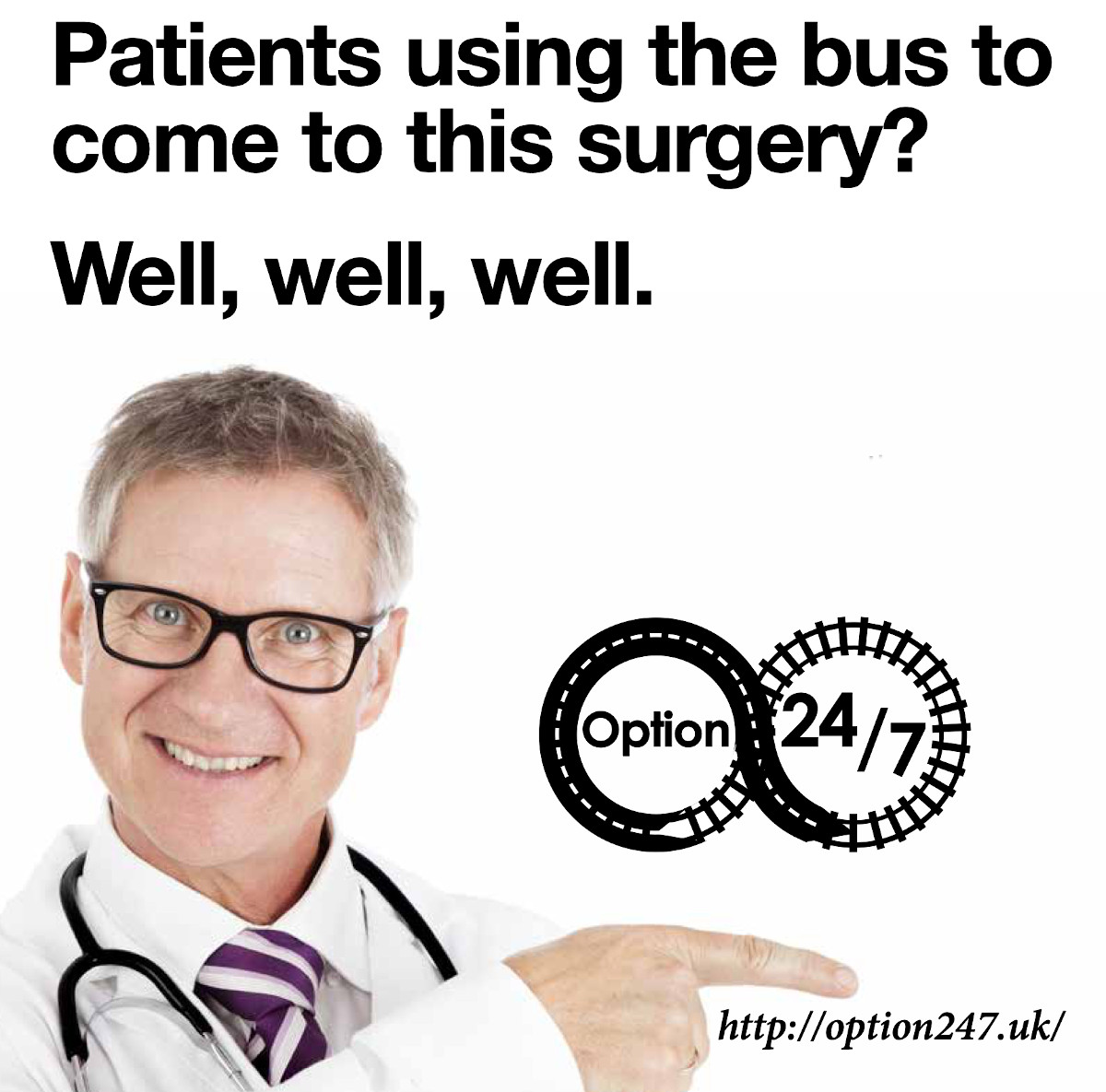 I asked "am I describing Utopia"? No - I'm describing practical, positive steps to a cleaner, better mix of getting around. There will still be awkward journeys where private car is the obvious choice, journeys that require more to be carried than you can easily manage on a bus, deliveries and other cases. And what I describe is "Bus Back Better" - the government's plan to take buses forward in a passenger positive (and have it work for the operators and councils too). This is a remarkable policy from them in many ways, accepting the need to buses to be an integrated social service ... and it closely mirror what I and the Option 24/7 team have been saying and working on for years. We could almost have written it!
I asked "am I describing Utopia"? No - I'm describing practical, positive steps to a cleaner, better mix of getting around. There will still be awkward journeys where private car is the obvious choice, journeys that require more to be carried than you can easily manage on a bus, deliveries and other cases. And what I describe is "Bus Back Better" - the government's plan to take buses forward in a passenger positive (and have it work for the operators and councils too). This is a remarkable policy from them in many ways, accepting the need to buses to be an integrated social service ... and it closely mirror what I and the Option 24/7 team have been saying and working on for years. We could almost have written it!The Bus Back Better mechanism offers funding to Local Transport Authorities - in our case Wiltshire Council - to continue to support buses provided that they provide and implement Bus Service Improvement Plans. Which involves either an "Enhanced Bus Partnership" or Franchising (Unitary's choice and I would be amazed if they go the latter route)
Published Thursday, 15th April 2021
Addressing Issues - School drop offs and pick ups
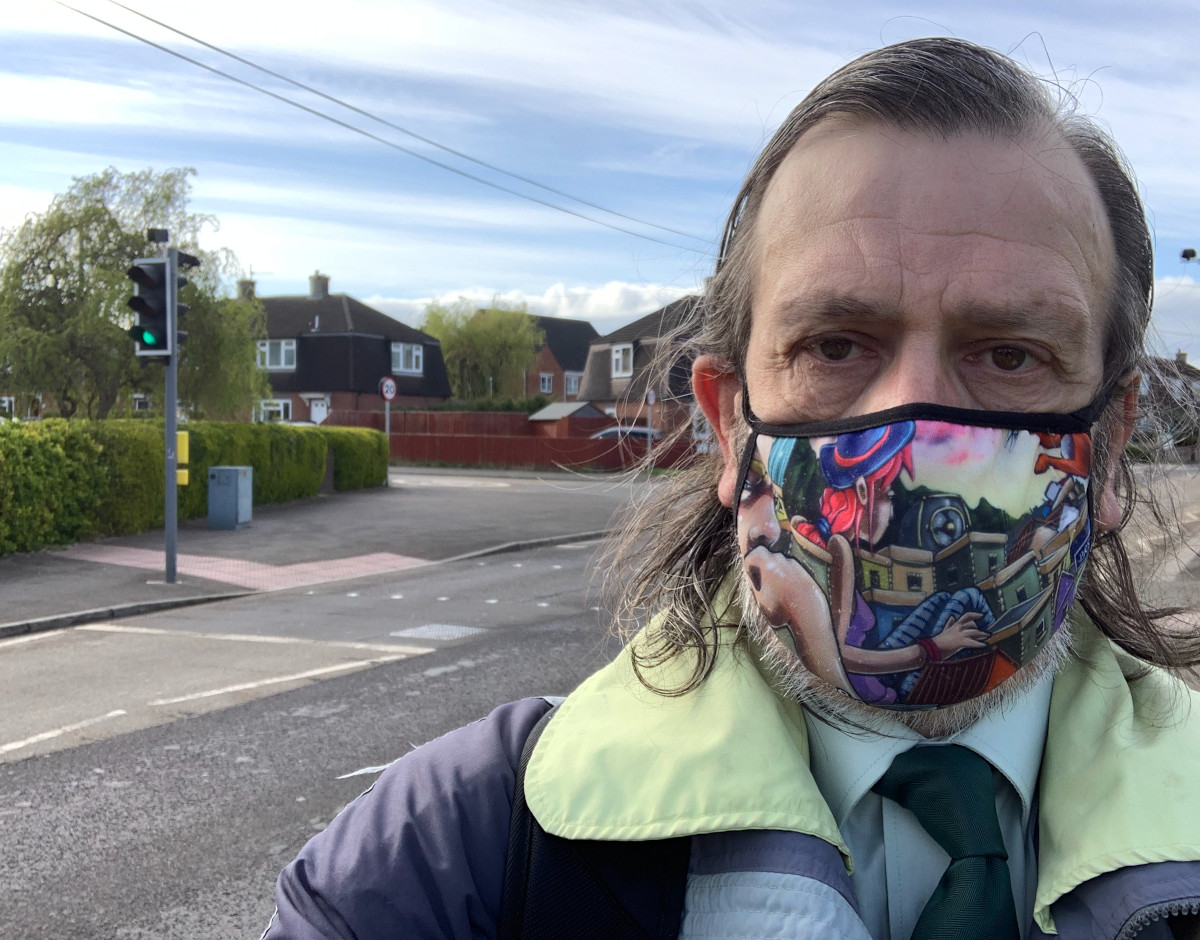 In my school days, I walked to my first primary school. Subsequent schools involved a train journey, with significant walks to and from stations at both ends. For a period, that gave me "Dad time" - he caught a different train in the mornings to his job just outside the City. How times have changed! These days, it's the school run in Mum or Dad's taxi for so many of our children, and that can create a very real problem around schools designed and built before habits changed - not only in terms of the congestion and parking issues for the school traffic, but also for the residents in nearby streets.
In my school days, I walked to my first primary school. Subsequent schools involved a train journey, with significant walks to and from stations at both ends. For a period, that gave me "Dad time" - he caught a different train in the mornings to his job just outside the City. How times have changed! These days, it's the school run in Mum or Dad's taxi for so many of our children, and that can create a very real problem around schools designed and built before habits changed - not only in terms of the congestion and parking issues for the school traffic, but also for the residents in nearby streets.There is one primary school in the Melksham South Ward - The Aloeric School - and it's at the end of a short cul-de-sac. Two further dead end (for vehicles) roads lead off the cul-de-sac, with around 70 private homes - many with two car families - living on them. "Someone's going to have an accident sometime" and "If an ambulance needs to get to my house, it won't be able to". Those are a couple of the comments to me as I went around dropping off leaflets.
The issue is not a new one. And you have what seem to be an immovable object (the homes and residents around) against an intractable force (parents wanting to deliver their children safely to school and pick them up later).
How has this arisen?
* Melksham has grown, and children live further from the school now
* More people have cars
* Government school choice policy allows the selection of a school which you can only reach by giving a lift
* The Aloeric school is popular / sought after
* There are fears for the safety of children making their way to school on their own in the modern world
* There has been / is no / not much extra provision at the school for car pick up and drop off
* People seem less inclined to share lifts (ride share seems a very hard sell!!)
* An arrangement to use the pub car park in the days it was a "Hungry Horse" is no longer in place
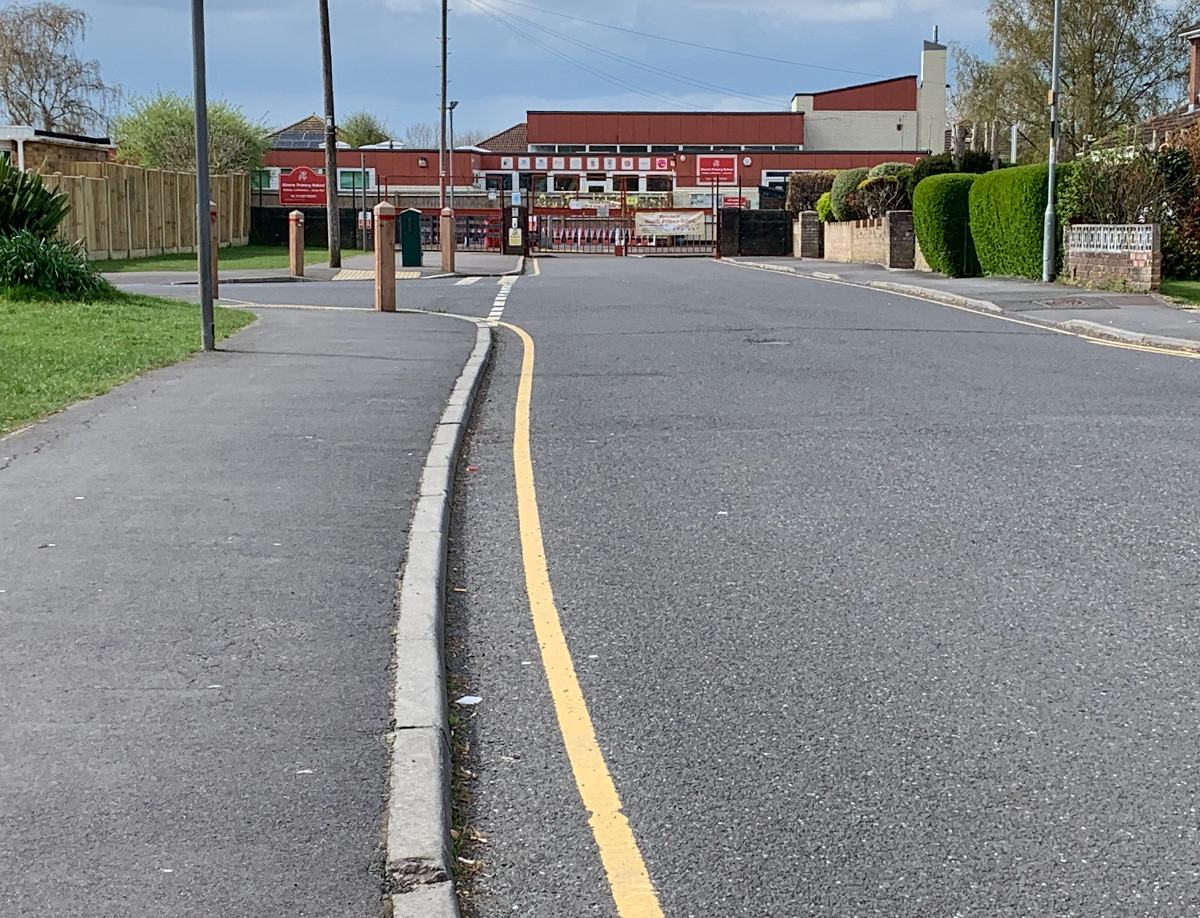 Yellow lines have attempted to reduce the problem, but it appears that they have just moved the problem, and also infuriated those who live behind the yellow lines and see them not fully enforced. Afternoons are said to be worse, as that's not so much the quick drop off but the wait for the kid(s) to come out of school.
Yellow lines have attempted to reduce the problem, but it appears that they have just moved the problem, and also infuriated those who live behind the yellow lines and see them not fully enforced. Afternoons are said to be worse, as that's not so much the quick drop off but the wait for the kid(s) to come out of school.So - can anything be done? Does anything need to be done? Please let's look at the causes of the problem, and not just at sticking plaster measures to mitigate them.
* I am delighted to see a new primary school being added on one of the housing developments just off Pathfinder Way; although just outside the Melksham South Ward, that will be within walking distance of the end of Longford Road / bottom of Campion Road
* Improved provision of (and encourgament to use) Walking and Cycling routes. Some are good - but an exit on foot and for cycles onto Lime Avenue - a path 20 metres long - would save a 400 metre walk around, and that would offer a real encouragement to families living in Lime Avenue, Hazelwood Road, Cedar Close and half a dozen other streets to walk to school!
* I have to find myself wondering if a new arrangement to use the West End car park could be negotiated in the mutual interest of everyone.
* Towards the longer term, as we become more public transport and less multiple private fossil fuel car dependent, should we be encouraging parents to choose schools which fit in with this new style of living; I am not suggesting any transfer of children already at or booked in, but let's alert parents to the benefits of walking / cycling to a local school as they book the next generation in. Healthier, fitter, and perhaps saving the cost of that second car.
You will note that I have not put any onus on the householders near the school here. However, you can help mitigate the issue by timing journeys away from school time. "I shouldn't have to!" you may say; perhaps so, but you could really help if you did. When I was dropping off election leaflets, I planned my route in this area to be at a time away from school start / finish times.
And - if you drive the school and have little choice, please turn off your engine while you wait for Amelia or Oliver in the afternoon. And the residents would appreciate you keeping the radio at a reasonable volume too. Little thinks that would be greatly appreciated by the neighbours, and you may not have considered.
What's this got to do with Town Council? One of the roles of a town councillor is to help interface the elemets of the community - talk to people, help sort issues out, for the good of us all in Melksham South. Should you elect me (please vote GRAHAM ELLIS on 6th May), I assure you that this issue is on my radar and I'll see if there's anything to be done to improve the situation.
Published Wednesday, 14th April 2021
Persistance pays - overcoming political hurdles
 How has the political situation in Burma affecting my campaign? What about influences from the behaviours of Donald Trump and his supporters? Well - these are two reasons (Myanmar and American Politics) quote to me on Facebook as I tried (but failed) to boost a post there to help me reach voters in the Melksham South Ward for the Melksham Town election. It turns out there's a whole lot more complexity involved in saying "Please take a look and me and vote for me" than saying "Please choose me for your python training" or "Santa will be oin the train on 12th December".
How has the political situation in Burma affecting my campaign? What about influences from the behaviours of Donald Trump and his supporters? Well - these are two reasons (Myanmar and American Politics) quote to me on Facebook as I tried (but failed) to boost a post there to help me reach voters in the Melksham South Ward for the Melksham Town election. It turns out there's a whole lot more complexity involved in saying "Please take a look and me and vote for me" than saying "Please choose me for your python training" or "Santa will be oin the train on 12th December".Problem overcome, however, through persistance and a series of authorising steps - at each step trying again and being give another reason why I couldn't boost. I am very much reminded of the story of Robert the Bruce. From Wikipidia: 'According to a legend, at some point while he was on the run after the 1305 Battle of Methven, Bruce hid in a cave where he observed a spider spinning a web, trying to make a connection from one area of the cave's roof to another. It tried and failed twice, but began again and succeeded on the third attempt. Inspired by this, Bruce returned to inflict a series of defeats on the English, thus winning him more supporters and eventual victory. The story serves to illustrate the maxim: "if at first you don't succeed, try try try again."' And, like Robert the Bruce, I keep trying until the goal is achieved. Actually, I have something of a record on that ... be it getting a decent train service, Sunday and evening buses, the best hotel in Melksham or the library's new location in the centre of town rather than out beyond Melksam Oak on the Devizes Road. Image from ((here)) on WikiPedia - it's in the public domain, but still deserves a "Thank You" to Kaldari - its originator.
Published Tuesday, 13th April 2021
Melksham, litter picking volunteer
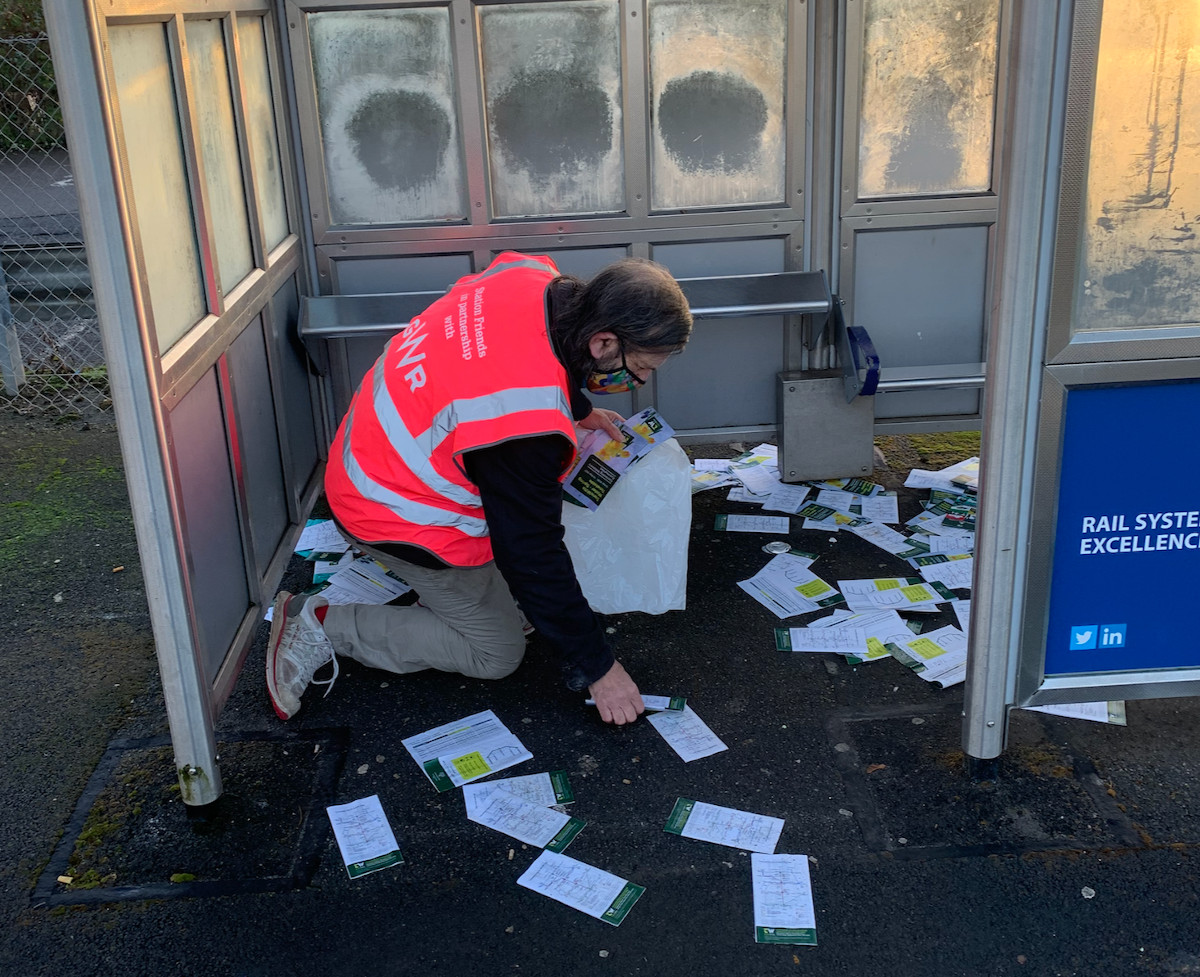 I took the opportunity to help "Melksham in Bloom" volunteers picking litter from "The Woody" on Queensway yesterday - catching up with old friends, making new ones, and catching up with what's making the town tick. Nothing new in my helping with litter picks - first picture today is from just before Christmas, clearing up leaflet vandalism at Melksham Station; I didn't shout about it at the time - just let the "powers that be" know that we were having problems. So much of this sort of work does on site unseen and has done for years.
I took the opportunity to help "Melksham in Bloom" volunteers picking litter from "The Woody" on Queensway yesterday - catching up with old friends, making new ones, and catching up with what's making the town tick. Nothing new in my helping with litter picks - first picture today is from just before Christmas, clearing up leaflet vandalism at Melksham Station; I didn't shout about it at the time - just let the "powers that be" know that we were having problems. So much of this sort of work does on site unseen and has done for years.You'll note the official GWR Hi-Vis tabard. Melksham Rail User Group volunteers are GWR trained and 'signed off' for rail safety and security, and at the station we keep our eyes open when at work. It's rare for an incident to require us to step in (though I can and have - on one occasion - had the line closed) but very, very common for us to provide a friendly face and help for people using the station, many for the first time.
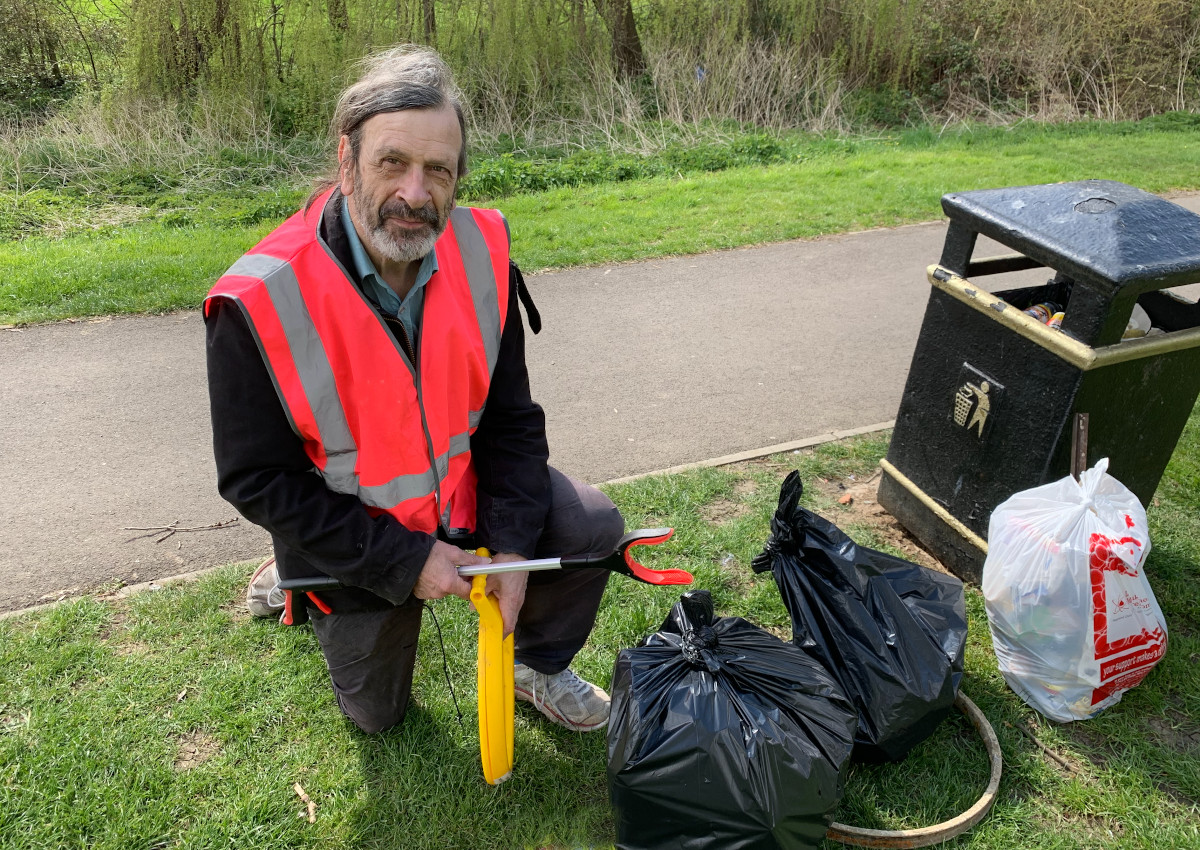 Yesterday, however, was a picture opportunity, standing out from the back room for once and letting people know that I'm around and there to help. Really there to help too - I rather surprised the organiser by taking another bag after this picture was taken, and doing another round. Far too used to parliamentarians who stick along just long enough for the exposure and photocall - yes, I have organised them too ;-) .
Yesterday, however, was a picture opportunity, standing out from the back room for once and letting people know that I'm around and there to help. Really there to help too - I rather surprised the organiser by taking another bag after this picture was taken, and doing another round. Far too used to parliamentarians who stick along just long enough for the exposure and photocall - yes, I have organised them too ;-) .We see our parks, streets and station at their worst when we do a litter pick. From the previous pick through to the one we're doing, they have moved from good through reasonable to being at their worst - but actually not all that bad. And good to see that the majority do make good use of the rubbish bins along the way; we're clearing up just after the minority at such events.
Published Monday, 12th April 2021
Big changes in our streets - electric car charging
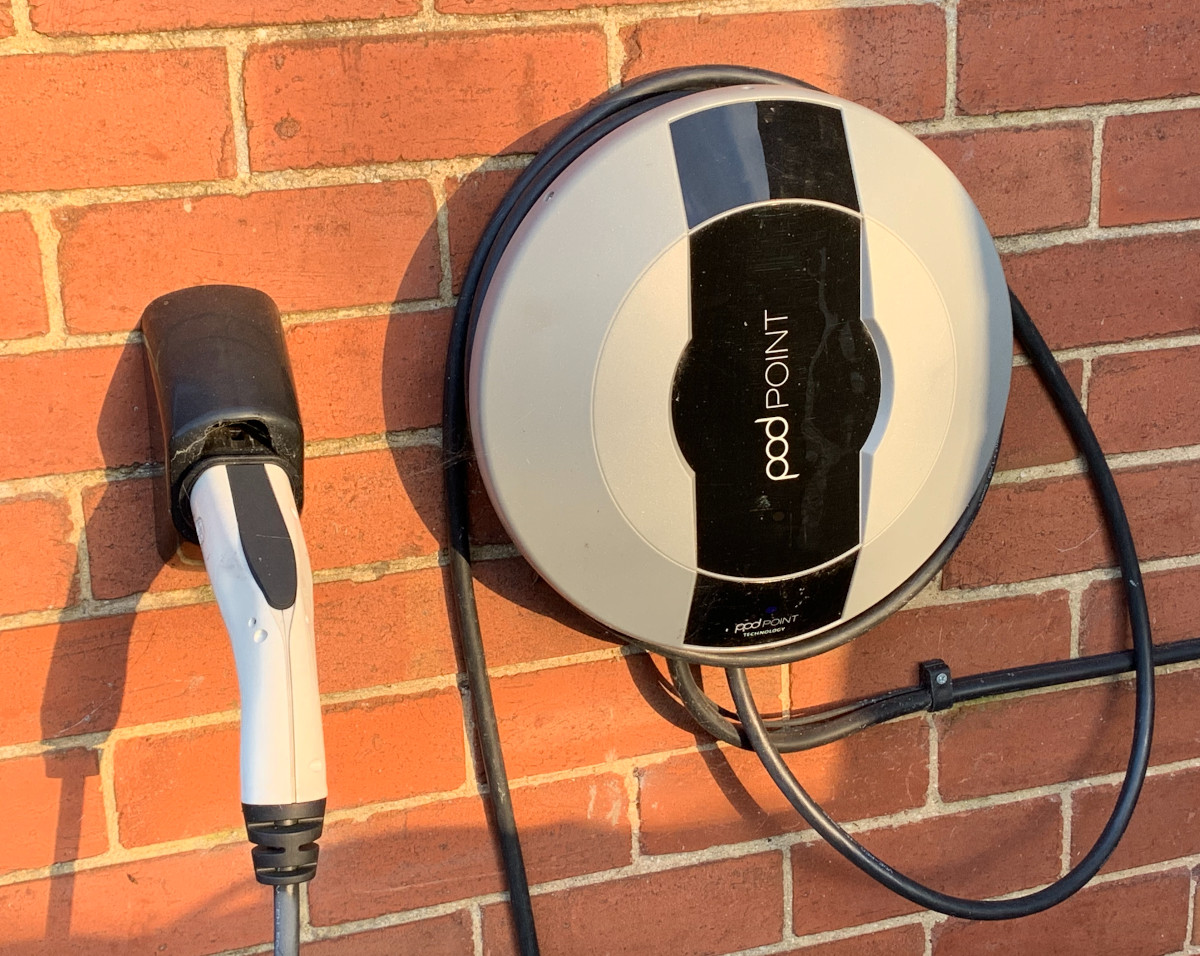 I know Melksham South "quite well" but walking around, delivering leaflets, is taking me into a number of quiet cul-de-sacs I have not visited before. I am struck by the number and variety of motor vehicles (not only cars) parked around. I have been considering just how much this or these vehicles need to change over the next decade, as we head for "Zero Carbon". Readers may agree or disagree with where we are headed, but we are headed there for sure and must look to establishing the best future quality of life for ourselves and for our community.
I know Melksham South "quite well" but walking around, delivering leaflets, is taking me into a number of quiet cul-de-sacs I have not visited before. I am struck by the number and variety of motor vehicles (not only cars) parked around. I have been considering just how much this or these vehicles need to change over the next decade, as we head for "Zero Carbon". Readers may agree or disagree with where we are headed, but we are headed there for sure and must look to establishing the best future quality of life for ourselves and for our community.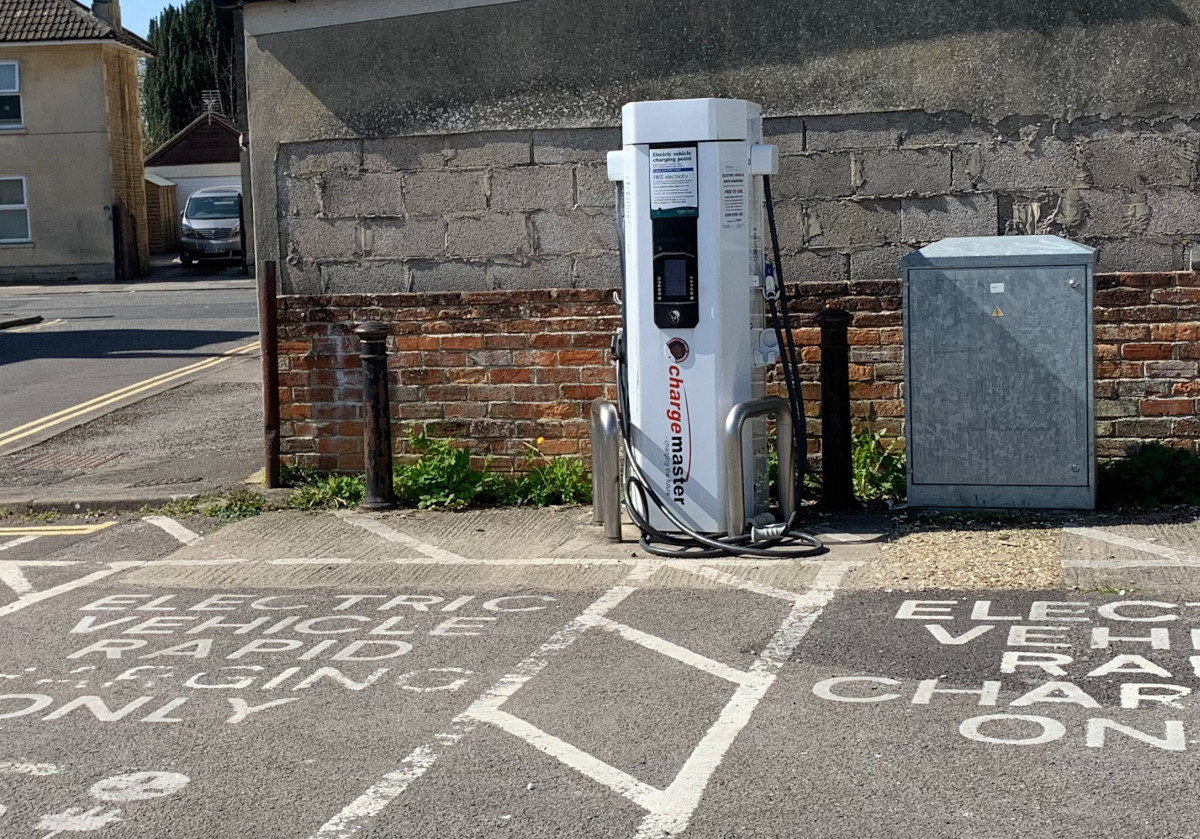 A move to electric powered vehicles is a partial solution. But (nationwide) only 40% of homes have car parking at which they can recharge their vehicles. Personally, Lisa and I are fortunate that we can park close beside our house, but so many, many people park across a pavement or remote and cannot trail cables / charge at home. There are charging points in King's Street Car Park and at the Melksham Hub on Station Approach, and a couple in Melksham without (Lowden Garden Centre and Beechfield House Hotel) too. But, really, these are not facilities that people who live locally will use on a regular basis - they're much more tuned for visitors, just as you (a Melksham resident reading this) would look to charge in Southampton or Taunton or Bristol if you drove a round trip there.
A move to electric powered vehicles is a partial solution. But (nationwide) only 40% of homes have car parking at which they can recharge their vehicles. Personally, Lisa and I are fortunate that we can park close beside our house, but so many, many people park across a pavement or remote and cannot trail cables / charge at home. There are charging points in King's Street Car Park and at the Melksham Hub on Station Approach, and a couple in Melksham without (Lowden Garden Centre and Beechfield House Hotel) too. But, really, these are not facilities that people who live locally will use on a regular basis - they're much more tuned for visitors, just as you (a Melksham resident reading this) would look to charge in Southampton or Taunton or Bristol if you drove a round trip there.One of the key elements of moving to electric cars will be an ability to refuel ("recharge") them in the same time it takes us to fill a fossil-fuelled vehicle. But even then, the electricty still needs generating somewhere, somehow. And you can have just as much road congestion with electric cars, and much of the same particles from rubber tyres on the road.
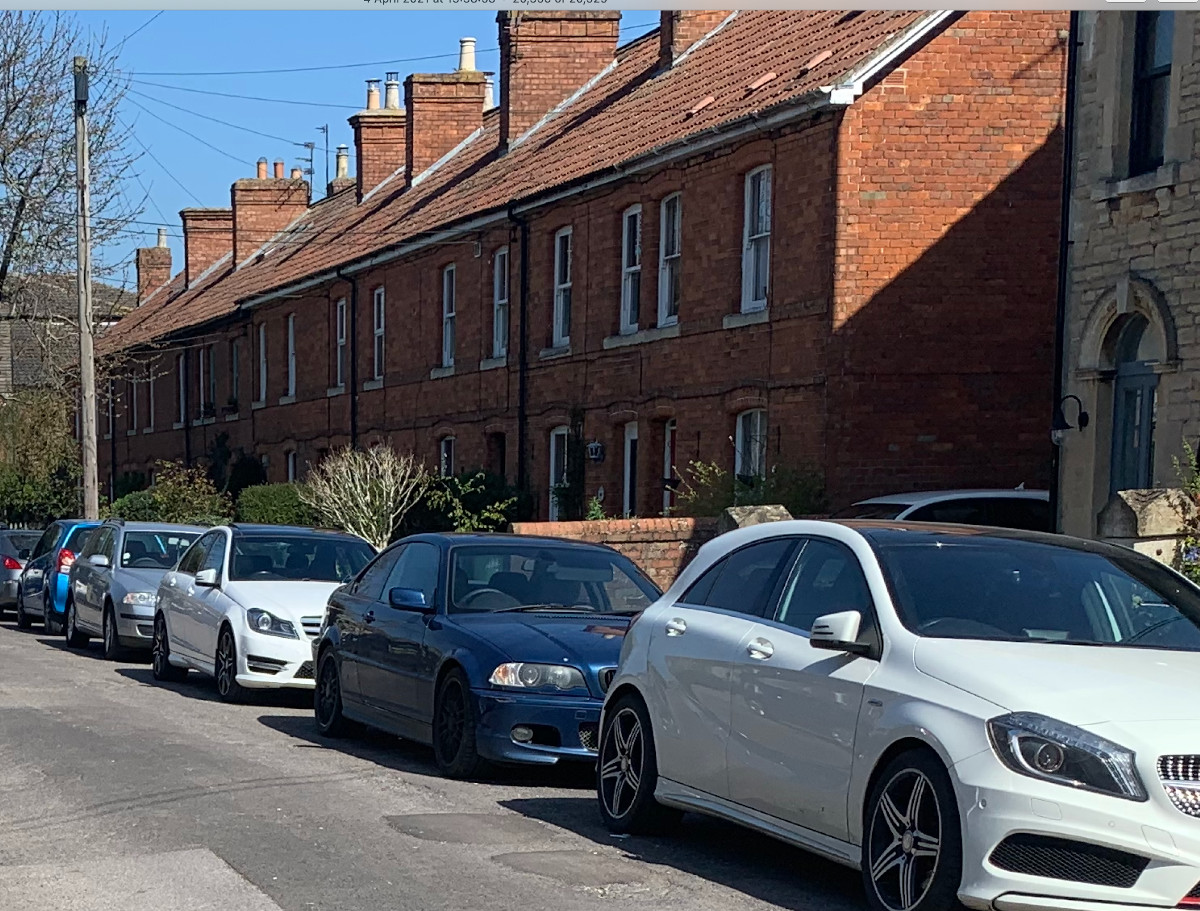 Thirty years ago, I drove 30,000 miles a year, in a fossil fuelled car. In the year to March 2020 (i.e. before Coronavirus), I drove under 1,000 miles and that in an electric car. It's not that I had stopped travelling, just that things have changed and I can use public transport for almost all my longer distance journeys. At times that may be slower, and I may have to wait a while for a service, but I can arrive at destination fresh rather than worn out, and if I choose I can work at my seat as I travel. It's really added a quality of life to my travel.
Thirty years ago, I drove 30,000 miles a year, in a fossil fuelled car. In the year to March 2020 (i.e. before Coronavirus), I drove under 1,000 miles and that in an electric car. It's not that I had stopped travelling, just that things have changed and I can use public transport for almost all my longer distance journeys. At times that may be slower, and I may have to wait a while for a service, but I can arrive at destination fresh rather than worn out, and if I choose I can work at my seat as I travel. It's really added a quality of life to my travel.As journeys get shorter, service frequency and local access to the service become more significant so although regional journeys and long distance ones have transformed easily for me, shorter distance trips have transformed less easily. It becomes more important for local public transport to become frequent, to pick up and drop off closer to home, and also to connect with onward transport. I'll come back to that topic in another day or two - but for the moment I'll conclude with re-iterating the news that we're going to need to see major changes on our residential streets in coming years - a re-organisation to aid charging electric vehicles and a reduction of vehicles over all - for quality of life purposed to be encouraged by much improved public transport, and much improved cycle and walking provision.
If elected to Melksham Town Council on 6th May 2021, it will not be my responsibility to pilot these changes through - but it will fall within my remit to campaign for best provision within all the changes for the residents of the town, businesses and visitors. And prior experience sets me up well for taking up that cause.
Published Sunday, 11th April 2021